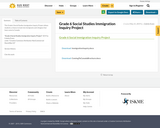
This Grade 6 Social Studies Immigration Inquiry Project allows students a chance to look into immigrants and refugees that have come to Canada.
- Subject:
- Social Studies
- Material Type:
- Unit of Study
- Date Added:
- 05/18/2019

This Grade 6 Social Studies Immigration Inquiry Project allows students a chance to look into immigrants and refugees that have come to Canada.
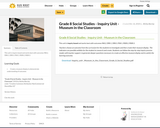
This unit is inquiry based and works best with outcomes IN8.2, DR8.1, DR8.3, PA8.1, RW8.2, RW8.3.

How do we teach students to identify fake news?
In a world where it is increasingly dangerous to simply trust what we read and see.
There is a fact sheet available for download as well.

In a “post-truth” era where people are increasingly influenced by their emotions and beliefs over factual information, fact and fiction can be difficult to distinguish, and fake news can spread rapidly through mainstream media sources and social networks. Moreover, fake news is often meant to do harm, by tricking us into believing a lie or unfairly discrediting a person or political movement.
Given this malicious intent, students must learn to approach news and information with a critical eye in order to identify intentionally misleading sources (although recent studies confirm that this is an uphill battle for both adults and young people). Teachers therefore play a crucial role in ensuring that their students develop the skills to decipher the many streams of information available to them.
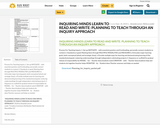
Process For Teaching Inquiry 1. Set up MOTIVATE – with essential question and frontloading, personally connect students to content 2. Standards or goals Meeting them through MULTIPLE MODALITIES and MEASURES to Articulate major learning goals, both conceptual (what) and strategic (how). o Provide multiple ways for learning and demonstrating learning of the standards/end goals/ enduring understandings through independent culminating projects 3. Sequence or scaffold for gradual release of responsibility by MODEL – for – Teacher does/students watch MENTOR – with – Teacher does/students help and students do together/teacher helps MONITOR – by – Student does/Teacher assesses and helps as needed
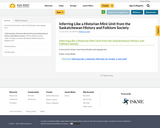
A mini unit for Grades 3 and 4 Social Studies and Language Arts
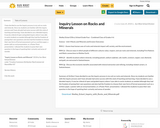
I have decided to use the Inquiry process in my unit on rocks and
minerals. Since my students are familiar with the inquiry process and I
have already had some success with this style of teaching and learning, I
have decided to use a blended inquiry. It was be a blend of open and
guided inquiry where I was able to assist students as needed although
they had the freedom of posing their own questions and also had the
freedom to choose their own form of formal assessment such as a
written paper, a poster with an oral presentation, or a Power Point
presentation. I allowed the students to pose their own question in the
hope of sparking their curiosity and sense of wonder.
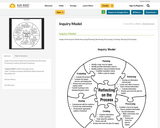
Image of the Inquiry Model discussing Planning, Retrieving, Processing, Creating, Sharing & Evaluating
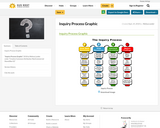
Inquiry Process Graphic
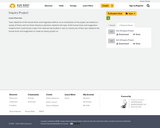
Topic: Mysteries of the Human Brain and Imagination Before: As an introduction to the project, we looked at a variety of fiction and non-fiction literature selections related to the topic of the human brain and imagination. Students then could choose a topic from what we had studied in class or choose one of their own related to the human brain and imagination to create an inquiry project on.

"Learning for Justice seeks to uphold the mission of the Southern Poverty Law Center: to be a catalyst for racial justice in the South and beyond, working in partnership with communities to dismantle white supremacy, strengthen intersectional movements and advance the human rights of all people."

This is the most recent version of the chart, updated August 2018.
See this post explaining the updates.
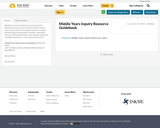
Middle Years Inquiry Guidebook.
A resource guide for beginning the inquiry process with your students. Links to many resources and mini-lesson ideas.
Resources included:
- Brainstorming & forming research questions
- Skimming & Scanning
- Online Research Skills
- Note taking & paraphrasing
- Embedding quotations
- In text citations & works cited
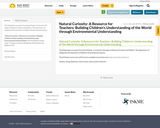
The following is an expert from the full book. It is the first 26 pages of Natural Curiosity 2nd Edition: The Importance of Indigenous Perspectives in Children's Environmental Inquiry.
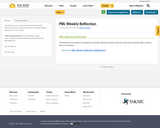
The following is an example of a template for a weekly reflection students could use if they were working on PBL or Genius Hour, or any project.

In this lesson, students consider the meanings of the term “fake news” and learn facts about the news industry that will help them recognize legitimate sources of news. They use an educational computer game to learn how to track a news story to its original source before evaluating its reliability, then practice the same skills “in the wild” with actual news stories.
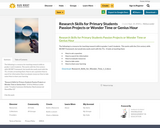
The following is a resource for teaching research skills to grades 1 and 2 students. This works with the 21st century skills SECRET framework, but would also easily work with the 7Cs. It looks at teaching them:
How to ask a question
How to search for information
How to evaluate resources
How to take notes
How to share your learning
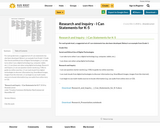
For each grade level, a suggested set of I can statements has also been developed. Below is an example from Grade 1:
Grade One
Social and Ethical Use of Digital Technologies
I can take turns when I use a digital technology (e.g. computer, tablet, etc.).
I can show care when using digital technology.
Research and Inquiry
I can use question starter words (e.g. 5 Ws) to guide my online searches.
I can read visuals from digital technologies to discover information (e.g. SmartBoard images, images from the internet).
I can begin to use multi-media sources to locate information (e.g. use audio from online story or CD).
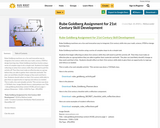
Rube Goldberg machines are a fun and innovative way to integrate 21st century skills into your math, science, STEM or design learning class.
Rube Goldberg machines involve using a series of complex steps to do a simple task.
Students first begin reflecting on what 21st century skills they will need to pull this activity off. Then they must make an effective plan as a group before they are able to gather their materials and build. The plan can (and likely should!) change as they work and that is fine. Students should reflect on their 21st century skills daily to give them an opportunity to regroup and refocus as needed.
This is really a fun and valuable activity! This version was done a 7/8 Math class.
Image Details
Source: www.pxleyes.com
Title : rube goldberg photoshop contest (4530), pictures page 1 – pxleyes
Dimension : 1500 x 1230
File Type : JPG/JPEG

"C21 Canada and the CEO Academy provides a national forum for education leaders to share ideas and build capacity for system-wide transformation. The organization brings together executive leaders of school districts and knowledge-sector businesses who share the belief that 21st century competencies and innovations in learning must be scaled on an urgent basis. The Spiral Playbook: Leading with an inquiring mindset in school systems and schools points the way forward. It describes a sustainable approach to professional inquiry that aims to transform how educators learn and lead – with teams and across networks.
Order your copies of the Spiral Playbook. View the Spiral Playbook, the Quick Reference Guide or download a Slide Presentation."